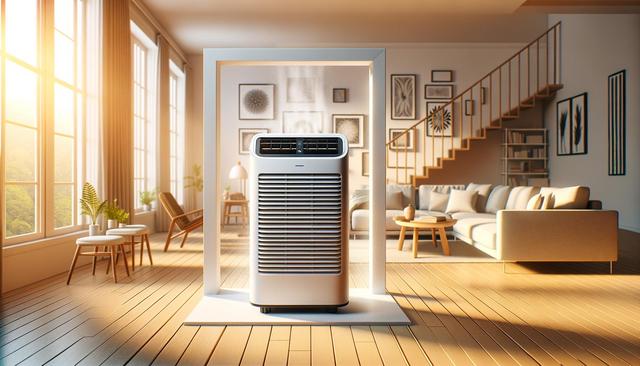
Stay Cool Anywhere with Mobile AC
What is a Mobile Air Conditioner?
A mobile air conditioner, often referred to as a portable air conditioner, is a self-contained cooling unit designed to be easily moved from one room to another. These devices offer a flexible solution for individuals or families who want to cool specific areas without the need for permanent installation. Unlike window units or central HVAC systems, mobile air conditioners typically come with wheels and compact designs, making them ideal for small apartments, offices, or homes lacking built-in cooling systems. They operate by drawing in warm air, cooling it through a refrigerant process, and then releasing the cooled air back into the room while expelling warm exhaust through a hose that usually vents out a window.
Mobile air conditioners are available in a range of sizes and capacities, generally measured in BTUs (British Thermal Units). The higher the BTU rating, the larger the space the unit can effectively cool. These units also often come with additional features such as dehumidifiers, timers, and remote controls, which enhance overall convenience and usability. For renters or those who frequently change residences, mobile ACs offer a practical alternative to more permanent options.
Advantages of Using a Mobile AC
There are several compelling reasons why mobile air conditioners are becoming increasingly popular. Their primary advantage is portability, but they also offer other features that make them a convenient and efficient choice for targeted cooling needs. Here are some key benefits:
- Flexibility: Easily move the unit from one room to another as needed.
- Easy Installation: Most models only require a nearby power outlet and a window for the exhaust hose.
- Cost-Effective: More affordable than installing central air systems, especially for small spaces.
- Energy Efficiency: Cool only the areas you use, which can lead to energy savings.
Additionally, mobile ACs are often equipped with programmable thermostats and energy-saving modes, allowing users to manage their electricity usage more effectively. They are also a great solution for supplemental cooling—helping to balance temperature differences in multi-level homes or sun-exposed rooms.
Important Features to Consider
When choosing a mobile air conditioner, there are several features and specifications to keep in mind to ensure the unit meets your specific needs. One of the primary considerations is the size of the area you want to cool. A unit that is too small will struggle to maintain a comfortable temperature, while one that is too large may consume unnecessary energy.
Key features to consider include:
- Cooling Capacity: Measured in BTUs, it should match the room size for optimal performance.
- Noise Level: Some models operate more quietly than others, which is important for bedrooms or offices.
- Energy Efficiency Rating: Look for units with high EER ratings for better energy performance.
- Drainage Options: Some units offer self-evaporative technology, reducing the need to manually empty water tanks.
- Additional Functions: Units that also serve as heaters or dehumidifiers provide year-round utility.
Also, consider the length and flexibility of the exhaust hose, especially if you have unique window configurations. Remote controls, digital displays, and programmable timers can further enhance ease of use.
Maintenance and Care Tips
Maintaining a mobile air conditioner properly can extend its lifespan and ensure it continues to function efficiently. Regular maintenance not only helps retain cooling performance but also improves air quality in your living space. Here are a few essential tips:
- Clean or Replace Filters: Check filters regularly and clean or replace them as needed to maintain airflow and efficiency.
- Inspect Exhaust Hose: Ensure the hose is free from obstructions and properly vented to the outside to avoid heat buildup.
- Empty Water Tank: If the unit doesn’t have an auto-evaporation feature, empty the water collection tank regularly.
- Keep Vents Clear: Avoid blocking the air intake and output vents to allow for optimum performance.
During off-seasons, it’s a good idea to clean the unit thoroughly and store it in a dry place. Covering the unit can also help protect it from dust and debris. Always refer to the manufacturer’s manual for specific maintenance recommendations based on your model.
Ideal Use Cases and Placement Tips
Mobile air conditioners are suitable for a wide range of environments, from residential to commercial spaces. They are particularly useful in situations where installing a permanent air conditioning system is not practical or allowed. Common use cases include:
- Rental Apartments: Where modifications to the building structure are restricted.
- Home Offices: To maintain a comfortable working environment without cooling the entire house.
- Server Rooms: Providing focused cooling to prevent overheating of electronic equipment.
- Temporary Living Spaces: Such as vacation homes, dorm rooms, or mobile homes.
Proper placement is crucial for efficient operation. Position the unit near a window and within reach of a power outlet. Ensure that the exhaust hose is as short and straight as possible to maximize airflow. Avoid placing the unit in corners or behind furniture, which can restrict air circulation and reduce effectiveness.
Conclusion: A Practical Cooling Solution for Modern Living
Mobile air conditioners offer a convenient and adaptable way to stay cool in various settings. Whether you’re dealing with a particularly hot room, a space without existing cooling infrastructure, or simply want the freedom to direct cooling where it’s needed most, these units provide a balanced combination of performance and flexibility. Their ease of use, relatively low cost, and portability make them well-suited for a wide range of users. By understanding the key features, proper maintenance practices, and optimal placement strategies, you can make the most of your mobile AC and enjoy a more comfortable living or working environment throughout the warmer months.